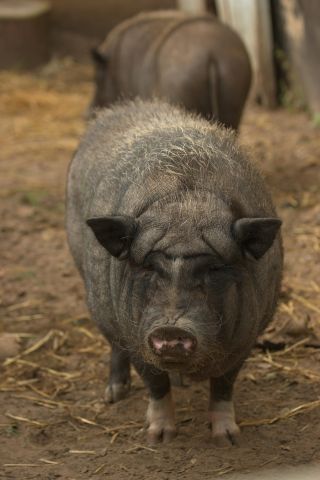Growing up in Iowa, where there are more pigs than people, I developed an affection for these smart, curious, and complex animals. I was recently reminded of the appeal of pigs after talking to a person walking her mini pig in a city park. I then found out about her work training mini pigs as emotional support animals and about some of the surprising abilities of pigs.
After this encounter, I explored what we know about the nature of pigs and how this nature can provide significant therapeutic assistance to human beings. And I became aware of the need for more research on pig-human interactions.
What follows is an introduction to mini pigs and their therapeutic value for people.

Source: Forest Simon/Unsplash
Basic Physical Information
Mini pigs range in size from 60 to 200 pounds, but most are between 70 and 150 pounds at maturity, the weight of a large dog—although shorter, typically growing to a shoulder height of 14 to 20 inches. The term “mini” distinguishes these small pigs from traditional farm pigs, which can reach 600 to 1,000 pounds and more than three feet in height. Mini pigs mature in five years and have an average life expectancy of 20 years.
The Psychology of Pigs
According to evolutionary biologist Marc Bekoff, pigs display a wide range of emotions and show uniquely individual personalities. They are also playful animals, with play satisfying their need for exploration and discovery and contributing to healthy development.
Pigs are especially adept at using spatial information, which shows itself in artificial tests, such as water mazes, and most naturally while foraging. And pigs remember the location, content, and relative abundance of previously discovered sites that contain food.1
Pigs are highly social animals, with keen olfactory perception and particular sensitivity to tactile information, primarily detected in the snout.
Thinking and Feeling. Neuroscientist Lori Marino and English professor Christina Colvin authored a substantial review paper elaborating on the emotional and cognitive capabilities of pigs. In particular, they reported that domesticated pigs are sensitive to the attentional state of humans, preferring attentive humans to inattentive ones. Pigs can also read the emotions of other pigs, from stress to eager curiosity, and they can anticipate when another pig is expecting something. Moreover, pigs understand natural human gestures, like pointing.
Perspective-Taking. By studying the choices pigs make after watching another pig go down a corridor for hidden food, researchers have demonstrated that pigs can take the perspective of other pigs, a sophisticated and socially advanced ability.
Learning and Playing. Science writer and animal behavior psychologist Mary Bates reports on a study demonstrating that pigs can quickly learn complex artificial tasks outside their natural repertoire. They can, for example, be trained to play video games with considerable success. While doing so, they show marked individual differences in abilities, and they continue to play the games even after the rewards change from food to social acts, such as praise and physical affection in the form of patting.

Source: Oriana Polito/Pexels
Of Pigs and People
A Larger View of the Mini Pig. Considered in combination, the documented abilities and qualities of pigs present an especially discerning and appealing animal for human beings: playfulness, emotional expression, remembering places of importance, awareness of attentional and emotional states, particular sensitivity to olfactory and tactile information, perspective-taking, and quickness and motivation with learning new tasks. Factoring in the manageable and familiar size of the mini pig, we find a uniquely sensitive and intelligent companion.
Mini Pigs as Emotional Support Animals and Therapy Pets. Only dogs are permitted as service animals, with the single exception of properly trained miniature horses. However, with the appropriate instruction, mini pigs make highly responsive and effective emotional support animals (ESAs) and therapy pets.
As an ESA, a mini pig can provide comfort, companionship, and therapeutic support to a person with a cognitive-emotional disorder such as depression, anxiety, or PTSD. With a signed letter of support from a licensed mental health professional, a person can claim a mini pig as an ESA for a particular condition.
Animal Behavior Essential Reads
As therapy pets, mini pigs can provide companionship during visits to health care facilities and assist with physical and occupational therapy.
Specific Therapeutic Abilities of Mini Pigs. As reported by the American Mini Pig Association, trained mini pigs possess focused therapeutic abilities in addition to their general qualifications. They calm children on the autism spectrum and help with their vocalization, comfort those with depression, ease anxiety and panic attacks and improve the symptoms of people with PTSD, react to low blood sugar in their owners with diabetes, and detect seizures. Each of these specific abilities is noteworthy and should be the subject of continued research.
Final Words

Source: Daniel Droscher/Pexels
Dogs and cats dominate our domestic world, but small pigs are proving themselves more than capable of providing emotional support and therapeutic assistance in our daily lives.
If we want an emotional support animal or a therapy pet with sensitivity and intelligence that doesn’t bark or shed, then a mini pig is a beautiful choice. Even if we don’t bring a pig into our lives, we can open ourselves up to the porcine world and appreciate it, doing our best to encourage the humane treatment of these smart, emotional, loving, perceptive creatures.

